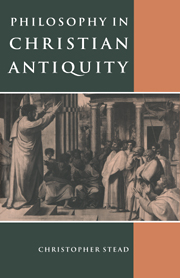Book contents
- Frontmatter
- Contents
- Preface
- List of abbreviations
- PART I THE PHILOSOPHICAL BACKGROUND
- 1 From the beginnings to Socrates
- 2 Socrates and the Platonic Forms
- 3 The philosophy of Plato's maturity
- 4 Aristotle
- 5 Epicurus and the Stoics
- 6 The Middle Platonists and Philo of Alexandria
- 7 The philosophy of late antiquity
- PART II THE USE OF PHILOSOPHY IN CHRISTIAN THEOLOGY
- PART III AUGUSTINE
- Bibliography
- Index of Names
- Index of Subjects
5 - Epicurus and the Stoics
Published online by Cambridge University Press: 29 September 2009
- Frontmatter
- Contents
- Preface
- List of abbreviations
- PART I THE PHILOSOPHICAL BACKGROUND
- 1 From the beginnings to Socrates
- 2 Socrates and the Platonic Forms
- 3 The philosophy of Plato's maturity
- 4 Aristotle
- 5 Epicurus and the Stoics
- 6 The Middle Platonists and Philo of Alexandria
- 7 The philosophy of late antiquity
- PART II THE USE OF PHILOSOPHY IN CHRISTIAN THEOLOGY
- PART III AUGUSTINE
- Bibliography
- Index of Names
- Index of Subjects
Summary
The philosophy of Epicurus and that of the Stoics developed at Athens from about twenty years after Aristotle's death. Epicurus, born c. 341 BC, came to Athens in 307–6; Zeno of Citium, some seven years younger, began to teach there c. 301. They soon acquired, and for some centuries maintained, an influence that eclipsed that of all rival schools. Xenocrates' attempt to create a coherent system of Platonism had not won widespread acceptance; both Speusippus and Aristotle had been notable innovators. Aristotle was succeeded by his pupil Theophrastus, best known for his pioneering work in botany, and later by Strato, another scientist; while many later members of his school – the ‘Peripatetics’ – turned towards critical scholarship. Platonists such as Polemo gave much attention to the intricate problems raised by logicians such as Stilpo at Megara, and Diodorus Cronus; and a sceptical movement was emerging under Arcesilaus, head of the Academy from c. 273. Both Epicureans and Stoics offered a practical policy for ordering one's life which could appeal to the ordinary man. It has been argued that this was especially needed in the disorientation caused by the decline of the Greek city-states in the face of Alexander's empire.
Epicureanism was to an unusual extent the unaided work of its founder. It remained an intellectual influence for some five hundred years, during which time its teaching altered remarkably little. Christians accepted a few points of Epicurean doctrine, but rejected its basic assumptions for various reasons, both good and bad, which we shall soon understand.
- Type
- Chapter
- Information
- Philosophy in Christian Antiquity , pp. 40 - 53Publisher: Cambridge University PressPrint publication year: 1994



